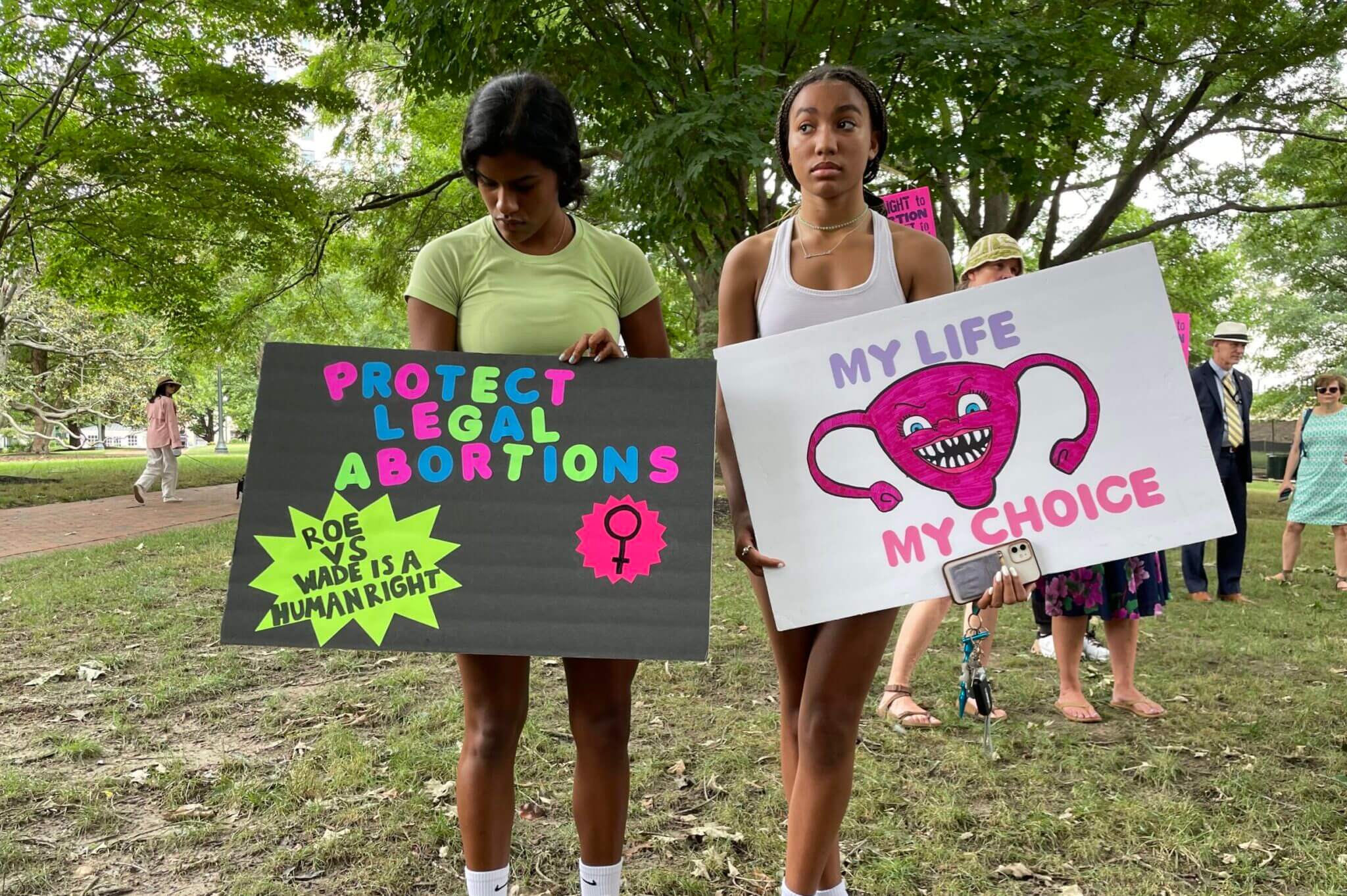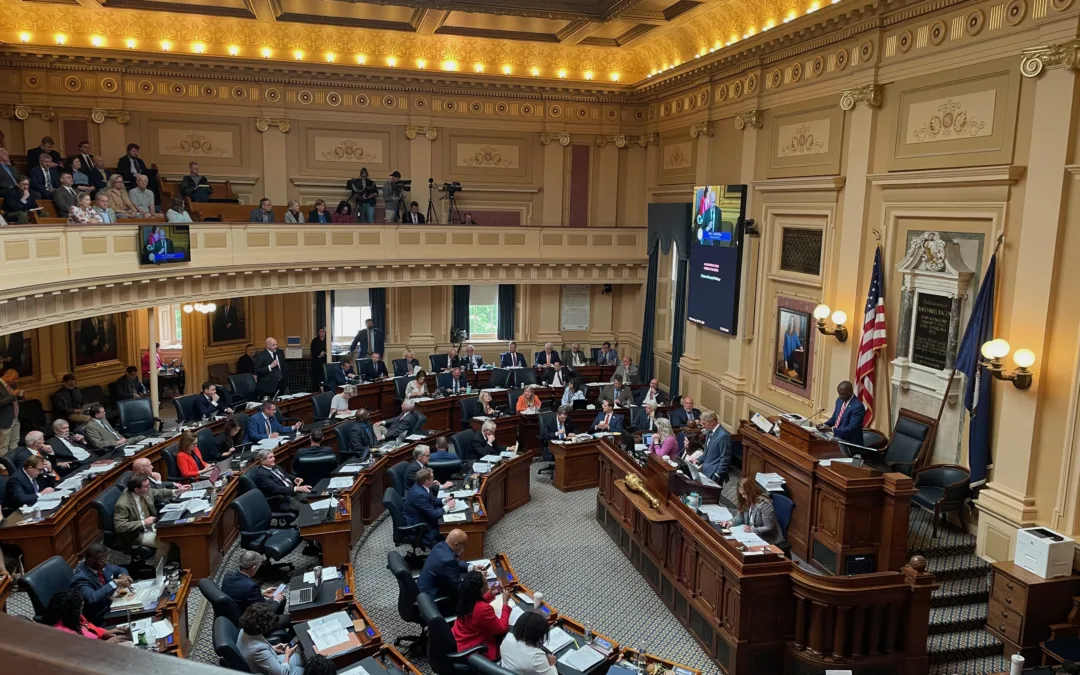
Alexandra Walker, 17 (right), and Sonia Krishna, 16 (left), attended a rally outside the Virginia Capitol after the U.S. Supreme Court ruling to overturn abortion protections established under Roe v. Wade. (Graham Moomaw/Virginia Mercury)
In a matter of weeks, the winner of the upcoming special election could potentially be voting on Gov. Glenn Youngkin’s proposal to ban most abortions in Virginia after 15 weeks of pregnancy.
Graham Moomaw, The Virginia Mercury
When former Virginia Sen. Jen Kiggans was running for Congress last year, she sidestepped questions about her stance on abortion by saying it’s up to states to decide, not the federal government.
That answer isn’t really an option for Republican Kevin Adams, who’s running in a special election this week to replace Kiggans, a Republican, in a swingy state Senate district based in Virginia Beach and Norfolk.
Democrats and abortion-rights proponents are eager to remind voters of that fact, even though the odds of a dramatic shift on abortion policy remain slim in a General Assembly under split political control. That could change in 2024, however, if Republicans win anti-abortion majorities in both legislative chambers in November’s General Assembly elections, when all 140 seats will be on the ballot.
The Senate special election Tuesday will be the first major indicator of how abortion politics could play out in post-Roe Virginia, where abortion remains legal but Republicans are close to having enough power to pass stricter limits on how far into a pregnancy the procedure is allowed.
In the race for the open Senate seat, the Democratic candidate, former Virginia Beach city councilman Aaron Rouse, is running a TV ad that riffs on his earlier career as an NFL safety, promising to be the “last line of defense” for abortion rights if elected.
Planned Parenthood Advocates of Virginia, whose PAC is putting $100,000 behind Rouse, is investing “a lot more resources and time and attention” in the special election than it would under normal circumstances, according to Jamie Lockhart, the group’s executive director.
“We know that every single seat matters,” Lockhart said. A Rouse win, she added, “would ensure that no abortion ban would get to Gov. Youngkin’s desk.”
Rouse successfully flipping the seat would lift Democrats’ hopes that protecting abortion access is a potent issue that could help the party bounce back from its unexpected losses in 2021. An extra Democratic vote in the state Senate, where Democrats had a 21-19 majority last year, would also make it nearly impossible for Republicans to pass new abortion restrictions in the session that begins Wednesday.
A victory by Adams, a retired Navy veteran whose website says he supports a 15-week limit and laws that “respect the rights of the mom and baby,” could signal to Republicans that pushing for tougher abortion restrictions isn’t as perilous as some might think for GOP leaders trying to govern a politically split state. But even if Adams wins, the legislative math won’t get any better for Republicans than it was last year, when the Republican-led House of Delegates chose not to press the issue knowing any anti-abortion bills would fail in the Senate.
Currently, state law allows largely unrestricted access to abortion in the first and second trimesters of pregnancy. Abortion in the third trimester, which begins around the 28th week, is allowed only when three doctors agree continuing the pregnancy poses a severe threat to the mother.
Republicans have advocated for an earlier cutoff at 12 weeks, 15 weeks or 20 weeks, proposals often based on disputed theories about when a fetus can feel pain.
When the U.S. Supreme Court struck down the Roe v. Wade precedent last year, giving states more power to restrict abortion, Youngkin said he would “take every action that I can to protect life” and indicated he was convening a group of Republican lawmakers to work on legislation for the 2023 session.
“We can build a bipartisan consensus on protecting the life of unborn children, especially when they begin to feel pain in the womb, and importantly supporting mothers and families who choose life,” Youngkin said in a news release at the time.
The governor has said he supports exceptions for cases of rape and incest and when the life of the mother is at risk. It’s unclear how lenient or limited those exceptions might be, because the administration-backed legislation has not yet been filed for public review.
Because almost all elective abortions happen in the early stages of pregnancy, the vast majority of abortions currently performed in Virginia would still be allowed under a 15-week limit. According to CDC data from 2019, 97.5% of abortions performed in Virginia occurred within 15 weeks. More recent data from the Virginia Department of Health shows that more than 95% of the 16,252 abortions reported in Virginia in 2021 occurred during the first trimester. Still, a stricter cutoff raises fraught questions about what options would be available to women who find out something has gone wrong late in a pregnancy.
“A ban is a ban, plain and simple,” said Lockhart. “The goal of this ban as with all abortion bans is to stop people from accessing essential health care.”
Republicans have pressed Democrats to explain exactly where they think the cutoff for elective abortions should be, at times pointing back to a controversial but failed Democratic bill from 2019 that would have loosened restrictions on abortion in the third trimester.
“Is the other side of the aisle all at 40 weeks?” Del. Emily Brewer, R-Suffolk, said in an interview. “I think that’s the most pertinent question that I really want an answer to.”
Several Democrats have said they support the existing law, which restricts abortion access after 27 weeks.
The Republican abortion restrictions expected to be filed for the upcoming session differ greatly in terms of severity and impact. Hard-right Del. Marie March, R-Floyd, has introduced a total abortion ban via a bill that declares “life begins at conception” and repeals every provision of state law authorizing abortion. Sen. Amanda Chase, R-Chesterfield, has indicated she intends to file similar legislation in the Senate.
Some conservatives, including Virginia Rep. Bob Good, R-Campbell, have criticized 15-week laws as not going far enough.
Todd Gathje, director of government relations for the Virginia anti-abortion group The Family Foundation, said his organization intends to support both a ban beginning at conception and a less drastic 15-week cutoff due to “certain political realities.”
“There are those within the pro-life community who recognize that politically and legislatively, things have to be done in an incremental fashion given what the dynamics are within the state legislature,” Gathje said. “At the end of the day, we want to do whatever we can to save as many pre-born babies as we possibly can.”
Acknowledging it’s unlikely that any new abortion restrictions can pass in 2023, Gathje said there are other steps the legislature could take toward the goal of making abortion “unthinkable,” like providing more support for new mothers.
“It’s vitally important that the legislature really look at proposals that help provide financial resources and information to mothers both pre- and post-birth,” Gathje said.
Before going to the Senate floor, abortion bills go through the chamber’s Education and Health Committee, where Democrats have a 9-6 majority. The committee’s chairwoman, Sen. Louise Lucas, D-Portsmouth, has repeatedly promised to stop anti-abortion bills that get to her docket.
The Democrats’ Senate blockade isn’t a sure bet, however, because Sen. Joe Morrissey, D-Richmond, has expressed unpredictable but generally conservative views on abortion. In a recent interview with Richmond TV station WRIC, Morrissey said he would take an “open mind” approach to abortion bills that come up this year.
Even if the bills are blocked in committee, there are ways Republicans could try to force a vote on the Senate floor, either by amending a different bill or by adding language to the state budget.
If Morrissey were to vote with Republicans in a floor vote, a 20-20 tie could be broken by Republican Lt. Gov. Winsome Earle-Sears. A 20-20 tie becomes even less likely if Democrats win the Virginia Beach race, because with 22 seats the caucus could still prevail with one defection.
If Senate Democrats fail to flip the Virginia Beach seat and have the same 21-19 Senate majority they had in 2022, the expected departure of Sen. Jennifer McClellan, D-Richmond, could be another complicating factor.
McClellan, one of the legislature’s top abortion-rights champions, is the heavy favorite to win a Feb. 21 special election for the Richmond-area congressional seat left vacant by the death of former Rep. Donald McEachin. The General Assembly is scheduled to adjourn Feb. 24 and will return April 12 to take up Youngkin’s vetoes and amendments.
If McClellan wins, Democrats could potentially be down to just 20 votes on at least some legislative business, depending on when she resigns her seat and is sworn into the U.S. House of Representatives.
In an interview, McClellan said she’s confident the timing of her election to higher office won’t disrupt any votes during the regular session, which will likely end before all the paperwork is complete to certify the results of the congressional election.
“But Aaron Rouse is going to win,” she said. “And with a 22-18 majority, whenever I leave, things are going to be fine.”
McClellan said she expects her caucus to hold firm on any anti-abortion bills coming over from the House.
“I’m not going to take anything for granted,” McClellan said. “But I am confident that Senate Democrats will block any efforts to roll back reproductive freedom.”
Politics

Youngkin, Democrats to start over on budget talks
The Republican governor stood with Democratic leaders in the General Assembly on Wednesday in a bid to ease tensions over their budget debate....

VIDEO: Domestic abuse victims speak out against the gun law bills Gov. Glenn Youngkin vetoed
Senate Bill 47 and House Bill 46 aim to close the loophole that allows offenders to transfer their firearms to someone else instead of relinquishing...
Local News

Virginia verses: Celebrating 5 poetic icons for National Poetry Month
There’s no shortage of great writers when it comes to our commonwealth. From the haunting verses of Edgar Allan Poe, who found solace in Richmond's...

Join the fun: Recapping Family Literacy Night’s storybook adventures
When’s the last time you read a book aloud with a loved one? If it’s difficult to answer that question, then maybe it’s time to dust off that TBR...





